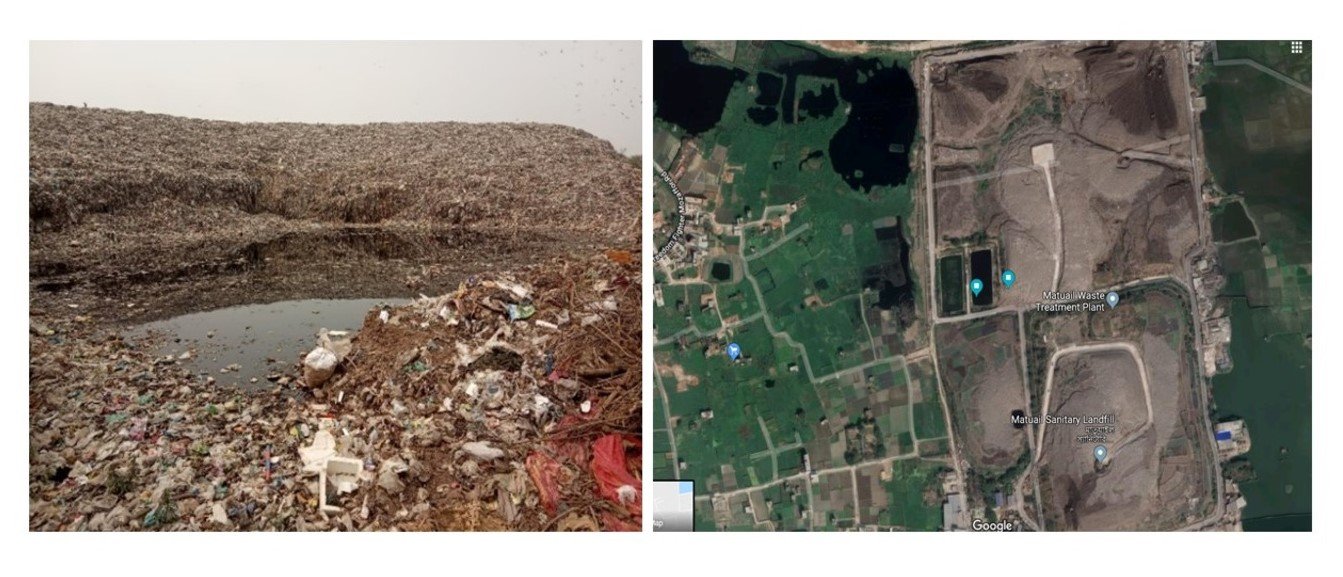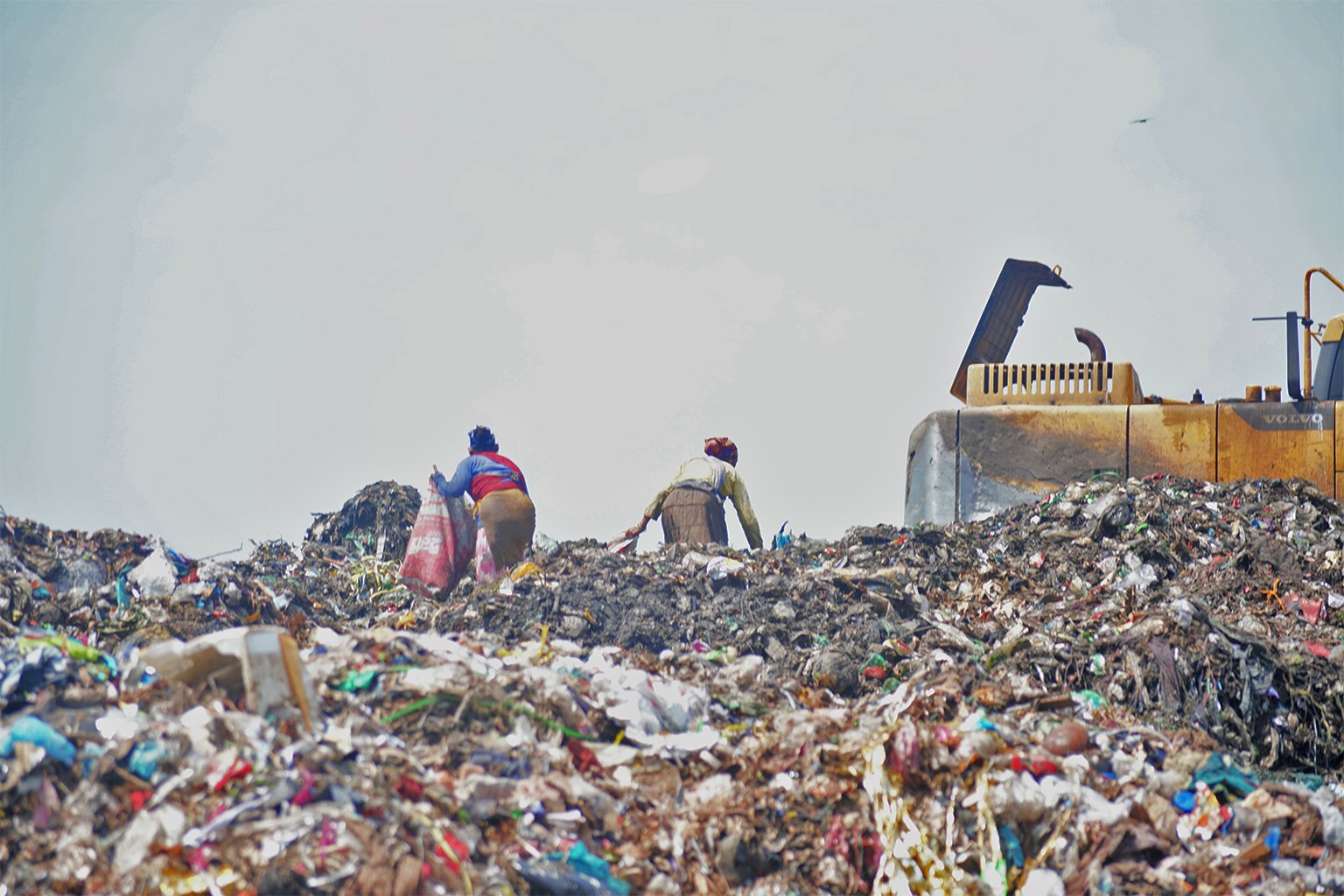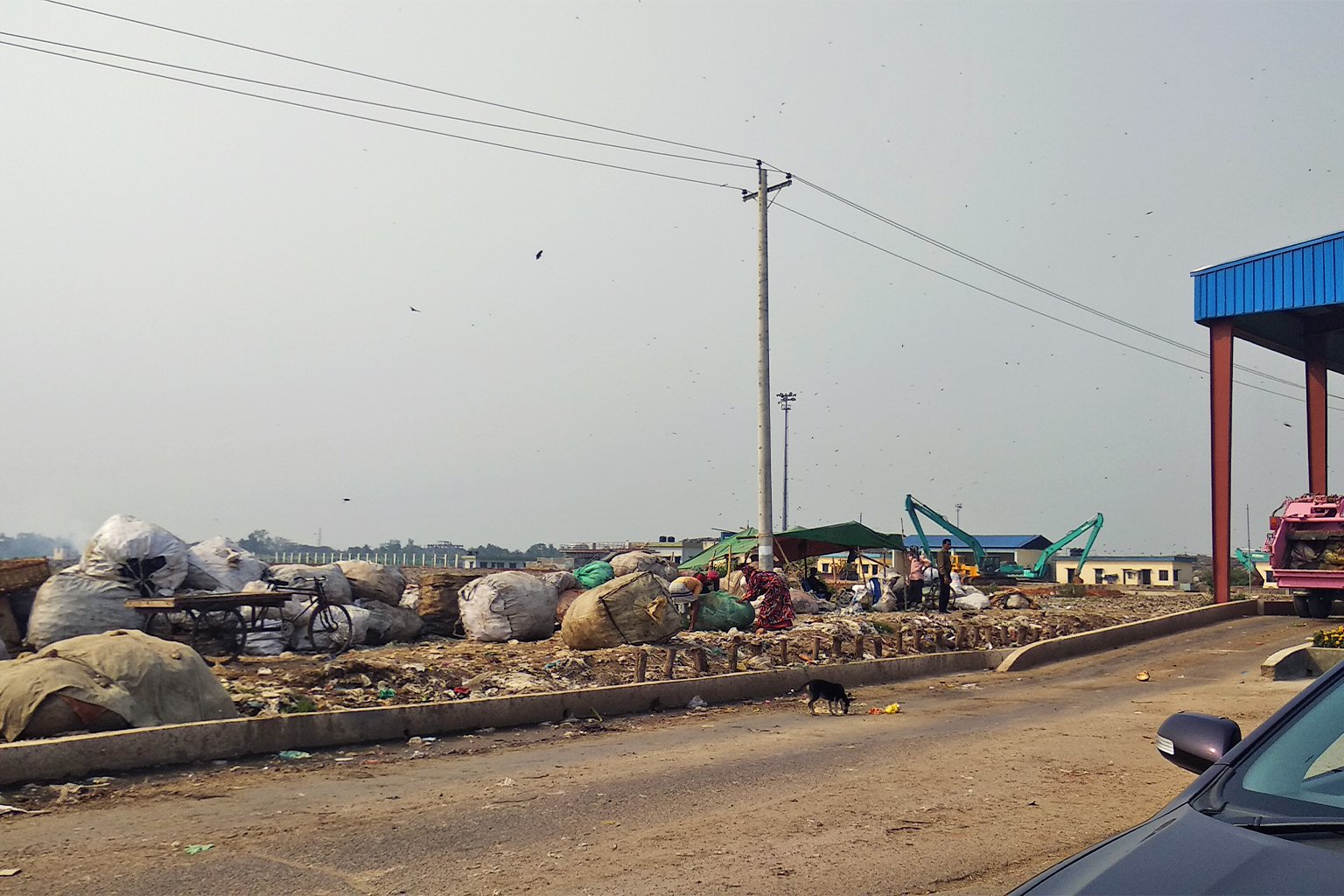- The four major waste landfills in Dhaka have left a serious environmental impact on the soil and groundwater of surrounding areas through leachate pollution, a study shows.
- It found levels of toxic metals in the surface and groundwater and in vegetable and rice crops in the vicinity of the landfill sites that were higher than prescribed safe limits.
- Experts have called on the authorities to improve waste management, including better coordination between municipal and national authorities, as well as better-engineered landfill sites that minimize the chances of leaching hazardous waste.
- Municipal authorities deny the pollution near the landfills is due to the waste leakage alone, and say they plan to expand the city’s largest landfill site, both aboveground and underground.
DHAKA — Muzammel Hoque, 40, lives in the village of Konda, near the largest landfill that services the city of Dhaka, some 30 kilometers (19 miles) away.
“The landfill has destroyed the rich wetland biodiversity and cropland on which people’s livelihood depended,” he said, adding that “many villagers have shifted to other areas since the Dhaka city corporation started dumping waste here.”
For years, landfills in Bangladesh, such as the Amin Bazar facility near Konda, have polluted the environment and posed a health threat to the people. The waste spreads into nearby neighborhoods and farms, and toxic substances permeate into the ground, with no protective layers or adequate waste disposal facilities in place.
Dhaka is served by four major landfills, all of which have left a serious environmental impact on the soil and groundwater of surrounding areas through what’s known as leachate pollution, a 2021 study shows.
The study, by researchers at Dhaka’s Jahangirnagar University, found toxic metals in the surface and groundwater in the vicinity of the landfill sites, at concentrations higher than the safe limits determined by the Department of Environment and the World Health Organization (WHO).
This happens through the process of leachate pollution, in which toxic liquids and heavy metals leak into the soil from solid waste that’s dumped in non-engineered landfills.
“It is necessary to have several protective layers at the bottom of an engineered and sanitary landfill, but we didn’t find it in the ones in Dhaka’s outskirts,” said study co-author Shafi Mohammad Tareq, a professor at Jahangirnagar University’s Department of Environmental Sciences.
The study also found toxic chemicals in rice crops and various vegetables being grown near the landfills, such as lead, cadmium, nickel and manganese. Consuming this food puts people at high risk of cardiomyogenic cancer, the study authors warn.
“The landfills are just dumping grounds. They were not built following a sanitary model. There are no protective layers and synthetic membranes that can guard against the leachate pollution,” Tareq said.
The study didn’t find the immediate presence or impact of heavy metals in people living near the sites. However, experts say the contamination is a process of slow poisoning, with a chronic effect on human health that’s not always immediately apparent.
There’s also growing concern over electronic waste pollution, as Bangladesh lacks appropriate legislation and systematic e-waste management strategies. The country produces 3 million metric tons of e-waste annually, including from ship-breaking yards, according to another recent study.
The leachate from dumped e-waste, including from cellphones, refrigerators, TVs, computers and air conditioners, also contains toxic heavy metals and chemicals that are detrimental to animals, humans, and the environment, the study says.
“The government should support the e-waste industry as it can help economically, as well as environmentally, by reducing waste generation,” said Dilip Kumar Datta, a professor of environmental science at Khulna University, who was not involved in either of the new studies.

Non-sanitary landfills
Municipal services in Dhaka are run by two city-owned corporations: Dhaka North City Corporation and Dhaka South City Corporation. Together, they collect about 7,500 metric tons of waste a day and dump it in the four landfills around Dhaka.
The Amin Bazar landfill, next to the Dhaka-Aricha highway, began operating in 2007 and has over the years adversely impacted tens of thousands of people living nearby, especially in the villages of Konda and Baliarpur.
“It gets worse during the rainy season as rainwater carries the landfill waste into the neighborhoods. We are surrounded by stench and a layer of dark, dirty water for days. Skin diseases are common among people living here,” Muzammel said.
During the dry season, the problems take a different form as the landfill spreads dust in the area, leaving people with breathing problems and other respiratory issues, added Muzammel, who is also the Konda village council secretary.
The soil structure in Dhaka is generally thick and of high quality, which works well against leachate pollution. However, soil and farmland around the landfills are becoming contaminated because of flawed waste management that they structure of the soil alone can’t prevent, Dilip said.
“City corporation authorities are barely aware of the concept of engineered landfill that ensures protection layers,” he said.
Both Tareq and Dilip suggested the authorities introduce a central management system to ensure waste sorting during the collection phase; separate collection methods for organic, electronic waste and medical waste; and solidification or stabilization for hazardous waste.
Both also said the government should consult waste management experts to address the issue and not continue to take a bureaucratic approach to the problem.

Lack of coordination on waste management
Bangladeshi authorities agree that landfills sites pose a hazard to the surrounding environment and communities, but don’t agree on who should be responsible.
The Department of Environment and the Dhaka city corporations appear to have embarked on different projects to improve waste management without adequate coordination.
“We are preparing a solid waste management policy and on the design of a sanitary landfill,” said Ziaul Haque, a director at the Department of Environment. However, he added, responsibility for ensuring a sound waste management system falls on the Dhaka city corporations, as the “DoE functions as a regulatory body while the city corporation works as an enforcement agency.”
The lack of coordination has had real consequences on waste management in the city. The Department of Environment recently had to suspend a $200 million project financed by the World Bank for proper waste management and source segregation in Dhaka, due to the unwillingness of the Dhaka North City Corporation (DNCC) to join it, according to officials.
DNCC chief executive Md. Selim Reza told Mongabay that the city was launching a waste-to-energy project, effectively generating electricity from 3,000 metric tons of waste daily.
“The city waste management will completely transform as soon as we move from waste to energy,” he said.

Reza added waste management has become a major challenge in Dhaka because of the growing population of the city. That’s left the corporation looking to expand the landfills, both aboveground and underground.
“DNCC is working to implement an underground waste management system,” he said.
The corporation has reportedly acquired more than 20 hectares (50 acres) of land next to the Amin Bazar landfill, where waste has pile up so high that it’s already overflowing.
However, Reza denied that farms around Amin Bazar had been contaminated by the landfill, and instead blamed “growing environmental pollution” all around.
Banner image: A boy sorts through the waste in a landfill in Bangladesh. Image courtesy of Shafi Mohammad Tareq.
Citations :
Parvin, F., & Tareq, S. M. (2021). Impact of landfill leachate contamination on surface and groundwater of Bangladesh: A systematic review and possible public health risks assessment. Applied Water Science, 11(6). doi:10.1007/s13201-021-01431-3
Roy, H., Islam, M. S., Haque, S., & Riyad, M. H. (2022). Electronic waste management scenario in Bangladesh: Policies, recommendations, and case study at Dhaka and Chittagong for a sustainable solution. Sustainable Technology and Entrepreneurship, 1(3), 100025. doi:10.1016/j.stae.2022.100025
Feedback: Use this form to send a message to the author of this post. If you want to post a public comment, you can do that at the bottom of the page.













